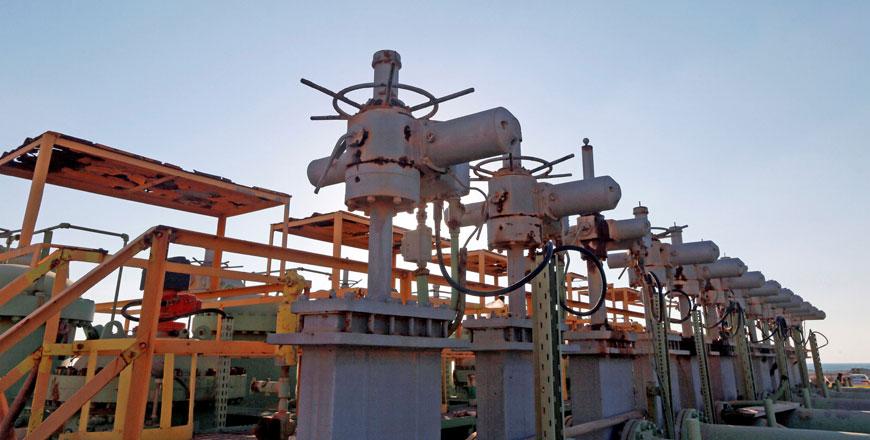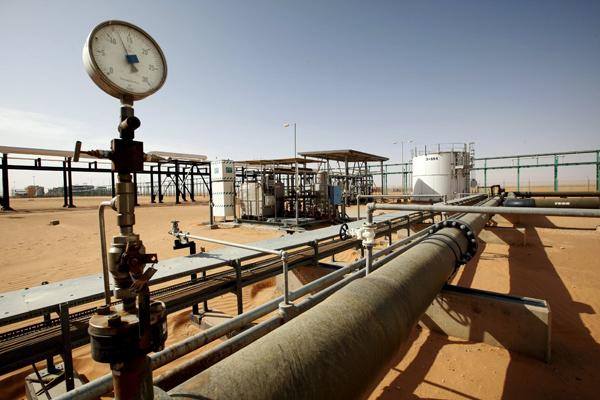You are here
Libya rivals fight for control of oil wealth
By AFP - Mar 22,2015 - Last updated at Mar 22,2015
AL BAIDA, Libya — The battle for Libya's oil wealth has taken on new dimensions as rival governments lay claim to the National Oil Company (NOC), further deepening divisions in the volatile North African nation.
The latest row erupted last week as UN envoy Bernardino Leon, who is mediating between Libya's warring factions, warned the country was heading towards destruction unless a political deal is found.
It also comes as the Daesh terror group, which has made huge profits from illegal oil sales in Syria and Iraq where it has seized chunks of territory, has gained a foothold in Libya.
The once lucrative oil industry has fallen victim to the unrest that has gripped the country since dictator Muammar Qadhafi was toppled and killed in the 2011 NATO-backed uprising.
Militants have stepped up attacks on the industry which had a pre-revolution output of about 1.6 million barrels per day (bpd), accounting for more than 95 per cent of exports and 75 per cent of revenues.
The economy has been reeling since December, when production fell to around 350,000 bpd as the Fajr Libya militia alliance, which includes Islamists, attacked oil terminals in the east.
Fajr Libya seized Tripoli in the summer and installed a government and parliament opposed to the internationally recognised government and legislature elected in June.
On Monday, the recognised government, which sits in the remote east between the cities of Tobruk and Baida, severed ties the Tripoli-based NOC.
"The legitimate Libyan government... is the only legitimate channel that has the right to deal and to contract companies to authorise gas and oil sales," it said in a statement.
'A messy situation'
To be valid, such sales must be made via the new NOC headquarters in the eastern city of Benghazi and approved by company Chairman Al Mabrook Abu Seif, it added.
The statement, published on its Facebook page, did not elaborate on how new contract payments should be made, but anyone who violates its decisions will be prosecuted.
On Thursday, the NOC board in Tripoli hit back.
"The NOC's position is neutral and receives no directives from either the Tripoli- or Baida-based governments and operates in complete independence from both sets of authorities," it said in a statement in English.
The NOC said it would continue to operate from Tripoli, where it was founded in November 1970, and would "remain an independent institution that operates outside political disputes".
Libya slid into chaos after the 2011 revolt, with former rebels and powerful tribes vying for power in a state whose oil reserves are estimated by OPEC at around 48 billion barrels.
"It really is a messy situation, with two governments, two parliaments, two heads of the same central bank, and now two NOCs!" said Valerie Marcel, an associate fellow at London's Chatham House.
The expert on oil and energy issues noted that "the two governments and their militias were already battling it out for control over oil production and export infrastructure".
'New level of complexity'
"Creating a rival NOC in Benghazi creates a whole new level of complexity and uncertainty for oil buyers," she said.
But Abu Seif disagreed.
"We sought to run the NOC in a neutral fashion but we have failed since Fajr Libya seized Tripoli and put the headquarters under its control," he said.
Abu Seif added that he would respect the terms of contracts which have already been struck with the Tripoli headquarters, but stressed that new ones must get his approval.
Marcel said the internationally recognised government has a clear advantage over its Tripoli rival because it controls export terminals.
This was not always the case.
In July 2013, rebels blockaded four export terminals to press for restored autonomy for the eastern Cyrenaica region, slashing output to just 200,000 bpd from 1.5 million bpd.
Under a deal with the then government, the rebels returned control of two terminals in April 2014 and the remaining two in July last year.
The deputy prime minister of the internationally recognised government, Abdul Salam Al Badri, has warned that dealing with NOC officials in Tripoli is "unlawful" and tantamount "to financing terrorist groups".
Related Articles
TRIPOLI — All oil exports from Libya's east have been suspended after operations halted at two key ports, the Tripoli-based National Oil Cor
BENGHAZI/TRIPOLI, Libya — Daesh militants set fire on Thursday to oil storage tanks in a fresh assault on Ras Lanuf terminal in northern Lib
LONDON/TRIPOLI — Libya's National Oil Corporation (NOC) has ambitious plans to restore output to pre-2011 levels after years of violence and





















